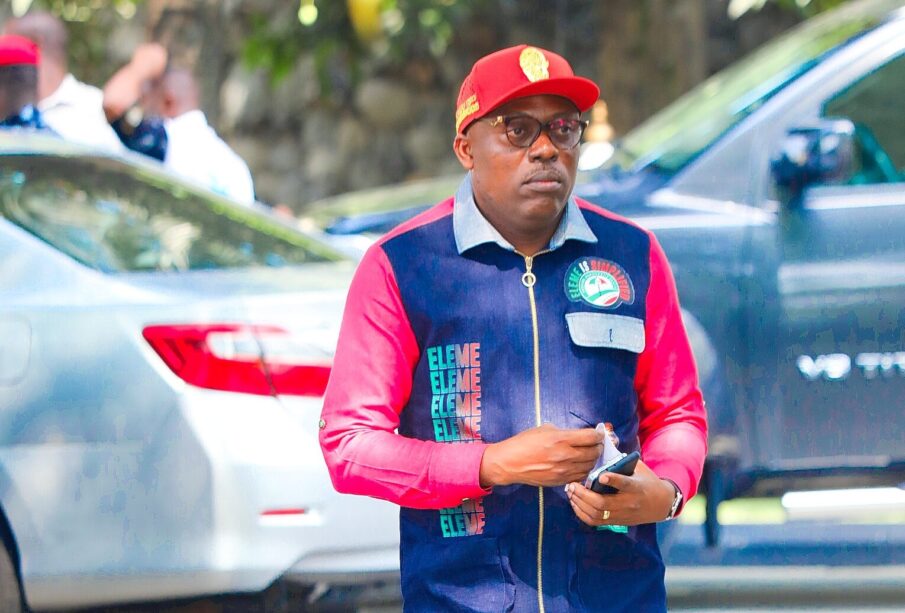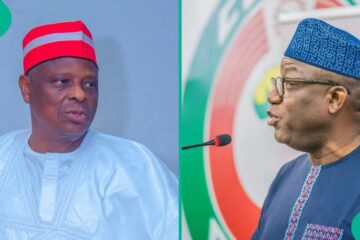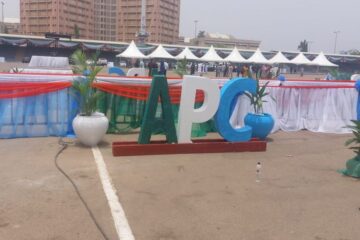
Siminalayi Fubara
Three things are certain in life: death, taxes and face-offs between godfathers and godsons in Nigerian politics. The open war between Chief Nyesom Wike, former governor of Rivers state, and Mr Siminalayi Fubara, whom he handpicked as his successor, is the latest in the catalogue of godfathers vs godsons which, I reckon, is as old as Nigerian politics. Godfathers, or godmothers, are heavyweights who deploy their political or economic might to handpick candidates for political offices. Ordinarily, their anointed candidates, or godsons/goddaughters, do not have the machinery to win elections or the clout to get appointments. They, thus, have to rely on these heavyweights.
My first experience of the power of godfathers was the Kwara state governorship election of 1983. The state was under the National Party of Nigeria (NPN) which controlled the federal government as well. The late Dr Olusola Saraki was the godfather of Kwara politics and always determined who would get what. He had helped the late Alhaji Adamu Attah become governor in 1979. We understood they fell out when Attah stopped coming to the Ilorin airport to receive him. Saraki, senate leader at the time, reportedly felt slighted and exacted his pound of flesh by supporting Chief C.O. Adebayo, candidate of the Unity Party of Nigeria (UPN), in 1983. For sure, Adebayo won.
We have witnessed face-offs between godfathers and godsons in states such as Anambra, Enugu, Borno, Lagos, Oyo and Kano. Sometimes, the godfathers overreach themselves by making excessive demands; other times, the godsons try to upstage their benefactors after getting power. The results are mixed: godfathers have won some wars, godsons have also won, and both have lost to a third force. In Kwara in 1983, the godfather won. In Edo in 2020, the godson, Mr Godwin Obaseki, defeated the godfather, Senator Adams Oshiomhole. In Anambra in 2003, the godfather, Chief Chris Uba, and the godson, Dr Chris Ngige, both lost out as a third force, Mr Peter Obi, took power.
I will be delighted to read an academic inquisition into this godfather phenomenon, a key feature of Afrodemocracy. My favourite case study remains Kwara, where Saraki anointed his son, Bukola, to be governor in 2003. In this instance, the godfather was also the biological father. By the time he finished his two terms in 2011, the younger Saraki had clinically retired his father from politics. I would also like to read about Lagos, where Tinubu has been the undisputed godfather since 1999, quenching all the rebellions of his godsons even when we thought his back was against the wall. I believe there are theories that will help my understanding of why these rebellions succeed or fail.
In my assessment of tussles between godfathers and godsons, the issue is mostly about control. Some godfathers, having helped their godsons into power, do not draw a line. They expect the godsons to be beholden to them. Some godsons, on the other hand, will want to prove that they are not only in power but they are also in control. This is where the tension begins to build up. How this is managed will determine where the pendulum swings. Some godsons wait until they are strong enough politically before tackling their godfathers, which may mean during the second term. They tackle their godfathers and may successfully run them out of town and become the new godfathers.
It is very common for godsons to accuse their godfathers of demanding too much compensation for helping them to power, especially with regards to electioneering expenses. That is why I am a bit surprised at what is happening in Rivers state. I am told that it has nothing to do with money, which is shocking. I would ordinarily suppose that Wike was asking for “refund” and Fubara rebelled. But at a peace meeting called some time ago by President Bola Tinubu, Wike was said to have implored the president to ask Fubara if he ever asked for one kobo from the governor since his inauguration. Fubara, from what I heard, confirmed to the president that Wike had never asked him for money.
Now, this is significant, given that Wike reportedly bought the governorship nomination form for him and footed the entire bill of the electioneering as well as the litigation. Fubara, according to reports, did not attend tribunal sittings for one day as Wike always stood in for him. But immediately after his election was upheld by the Court of Appeal, the dynamics took another turn and, as I was told, the governor stopped picking Wike’s calls. When I first heard of a cold war between them, I had my doubts — thinking it was too early in the day. It is a certainty in life that godfathers and godsons will fight either a cold or open war, but it usually takes time. In this case, it took less than five months.
Why did Fubara, who was the Government House accountant when Wike was governor, decide to part ways with his godfather so quickly? I understand he told the president that Wike does not show him enough respect as a governor. He reportedly complained that because of this, Wike’s allies in Rivers state government also do not respect him. If this is indeed the case, his decision to launch an all-out war against his godfather can be viewed from the perspective that every human being wants to be given some respect. How he goes about addressing the respect deficiency is another matter entirely. But he will likely look at himself in the mirror daily and say: “But am I not the governor?”
Wike, in his first open comments, accused Fubara of “hobnobbing” with his political adversaries. He said he would not fold his arms and watch his political structure demolished. “You cannot work and people will begin to bring enemies, those who fought you when you were struggling for the person to be in office. Nobody does that. I am not a political ingrate but don’t touch the political structure of the state. I will not shut my eyes,” Wike said. It is rumoured that some APC members are strategising for Fubara, who seems to have grown more confident daily, even bulldozing the assembly complex weeks after parts of the building were set ablaze amid rumours that he was about to be impeached.
When did Fubara start planning to upstage Wike? We can only guess, but it seems to me that he kept his cards close to his chest all the while. The first deal is to get power, after which you can assert your authority. I believe he was just waiting for the right time to strike. The crisis had barely started when the Ijaw National Congress (INC) issued a warning that nothing must happen to “our son”. They asked Tinubu to call Wike, his minister, to order. Now Ijaw youth leaders are saying they may not be able “to guarantee the safety of the oil installations” in Ijawland. Playing up his Ijaw identity was strategic. In addition, the powerful Odilis are, surprisingly, fully with Fubara, according to media reports.
Here are my takes on this crisis. One, this is politics at play. It is nothing new. I have read and heard comments that tend to suggest there is something special or unheard of about this face-off. We have seen this over and over again across Nigeria. The only thing about the Rivers case, for me, is that it started so early. Usually, crisis brews over time and, if it is not contained, explodes. But it could take up to a year for outsiders to know. An exception I can recall is Anambra state in 2003 when Ngige successfully fought off Uba in a matter of weeks. In Lagos, it took three years for the friction between Tinubu and Governor Babatunde Fashola to reach a boiling point, but it eventually simmered.
Two, even though we might not like it, godfatherism is a key feature of Afrodemocracy. Until we liberalise our democracy, godfatherism will continue to define our political culture. “Anointing” candidates for positions is such an African thing to do. There are people who would never have held power in Nigeria without godfathers. Someone like Fubara would not have been governor today without the help of a godfather like Wike. We can argue from now till eternity but that is a fact. He was not among the political heavyweights in the state who wanted the job. It seems it just fell on his laps. I know many Nigerian politicians who are hoping and praying for this kind of endorsement.
Three, the Wike/Fubara run-in looks like a case of “no retreat, no surrender”, so I am not holding my breath that rapprochement is in the pipeline. From where I stand, I can see that trust is gone. I do not see Fubara backing down after showing his hand so visibly and taking many actions against Wike and his political structure. Fubara has aligned with Wike’s rivals and even snatched some of his allies. For him, it is now a matter of “all or nothing”. Meanwhile, I do not see Wike embracing Fubara wholeheartedly even if the face-off is somehow resolved. This is not dissent but rebellion. All I can see is a fight to the finish. Maybe I am exaggerating things, but I can’t foresee genuine reconciliation.
All said, I find recent developments in Rivers to be quite troubling. We must not gloss over things, no matter where our sympathy lies. There are clear signals that we are moving deeper and deeper into the worst form of Afrodemocracy, where rule of law is the first casualty and impunity reigns supreme. Unfortunately, if there is a total breakdown of law and order, it is not only Rivers that will be hurt. The rest of Nigeria will suffer the consequences. May I recall that in 1999, some Niger Delta politicians recruited and armed young boys in the battle for political turfs. These boys transformed to militants and Nigeria is yet to recover from the resultant economic setback. A stitch in time…
Culled from TheCable











